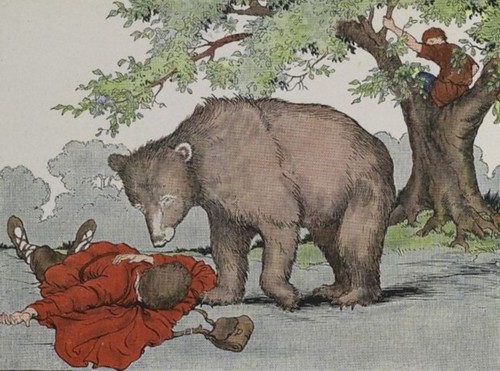Here is a round-up of today's blog posts - and for previous posts, check out the Bestiaria Latina Blog archives. You can keep up with the latest posts by using the RSS feed, or you might prefer to subscribe by email.
HODIE: ante diem septimum decimum Kalendas Ianuarias.
GAUDIUM MUNDO: Here are some Latin holiday songs for you to enjoy - Primum Noel Cecinit Angelus (a Latin version of "The First Noel"), O Lux Beata Trinitas (a hymn attributed to Saint Ambrose), and Sit Prosperus Iesus Nati (a Latin version of "We Wish You a Merry Christmas").
Myths & Legends: The art image for today's legend shows Ajax and Cassandra; you can also see the legends for the current week listed together here.
OWEN'S EPIGRAMS: The two new Owen epigrams, with Harvey's English versions, are Speculum, Fingere non Phidias, nec Apelles pingere motum / Novit: tu Phidia plus et Apelle facis.; and Echo, Vocem nulla potest ars sculpere, pingere nulla. / Sola repercussos exprimit echo sonos.. (They each come a vocabulary list!)
CAMERARIUS'S EMBLEMS: The two new emblems are Ne Iurato Quidem, Non nisi desectā credam tibi, scorpio, caudā, / Armaque ni ponas, foedera nulla dabo.; and Expecto Donec Veniat, Frigora fert patiens, spe veris, parva cicada: / Sperat et infestis mens bona semper opem.. (These have vocabulary too!)
VERBUM WIDGET: The word from the daily widget is ARRIPIO - which also has a brief essay at the Verbosum blog. Here's one of the sayings you can find in that essay: Occasionem arripe, "Seize the opportunity!"
GOOGLE BOOKS: Today's Google Books are Theatrum Lyricum and Knatchbull's Kalila and Dimna .
TODAY'S FABLES & STORIES:
ANECDOTE OF THE DAY: Today's anecdote is Leo Nemeae, the story of what is probably Hercules' most famous labor.
FABULAE FACILES: The NEW easy-to-read fable is Fur et Stultus, a hilarious little story about a confident fool and his shoes (and the fable comes with a vocabulary list).
FABULAE FACILES WIDGET: The fable from the Fabulae Faciles widget is Harundo et Quercus, a story about being flexible (this one also has a vocabulary list).
MILLE FABULAE: The "chunk" of Mille Fabulae et Una today is Fable 171 through Fable 180, including Lepus in Puteo et Vulpes, a story about a rabbit who gets stuck in a well and a know-it-all fox.
NEW MILLE FABULAE: The NEW fables with images are Uxor et Vir, Mercatum Facientes, a hilarious little story about a fun-loving husband and wife, and Pater, Filius, et Sclavina, a wonderful story about elder care - a problem then as now.
MILLE FABULAE WIDGET: The fable from the Mille Fabulae et Una widget is Ursus et Amici Duo, the famous story of two friends who have the bad luck to run into a bear.
AESOP IN ENGLISH VERSE: Today's fable from the English verse widget is The Dog and the Quaker, a story about a hypocritical Quaker.
TODAY'S MOTTOES & PROVERBS:
Tiny Mottoes: Today's tiny motto is: Non dormio (English: I do not sleep ... not a motto I can claim by any means: I like my sleep!).
3-Word Proverbs Verb-less: Today's 3-word verb-less proverb is Sale nihil utilius (English: Nothing is more useful than salt - and remember that in Latin sal means both salt and wit.)
Audio Latin Proverb: Today's audio Latin proverb is In terra caecorum monoculus rex (English: In the land of the blind, the one-eyed man is king). To read a brief essay about this proverb and to listen to the audio, visit the Latin Via Proverbs blog.
Maxims of Publilius Syrus: Today's proverb from Publilius Syrus is: Bis interimitur, qui suis armis perit (English: Someone who dies by his own weapons dies twice over ... and, sad to say, we are often our own worst enemies, with real weapons, or metaphorical ones).
Animal Proverb from Erasmus: Today's animal proverb from Erasmus is Virum improbum vel mus mordeat (English: Even a mouse will bite a wicked man; from Adagia 1.8.96).
For an image today, here is an illustration for the story about the bear: 135. Ursus et Amici Duo. Duo amici una faciunt iter. Occurrit in itinere ursus. Alter arborem conscendit et periculum evitat; alter, cum meminisset illam bestiam cadavera non attingere, humi sese prosternit animamque continet, se mortuum esse simulans. Accedit ursus, contrectat iacentem, os suum ad hominis os auresque admovet, cadaver esse ratus, discedit. Postea, cum socius quaereret quidnam ei ursus dixisset in aurem, respondit, “Monuit ne confiderem amico, cuius fidem adverso tempore non essem expertus.” Amicus certus in re incerta cernitur. (source)
